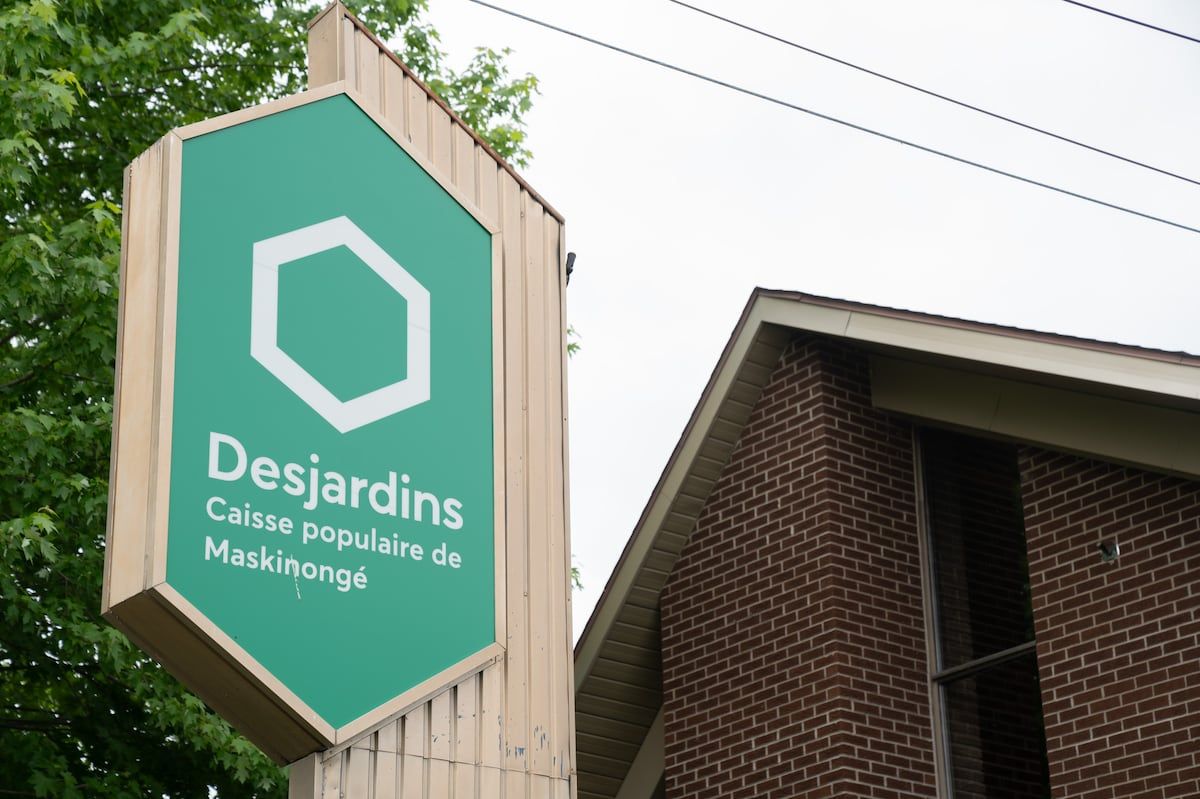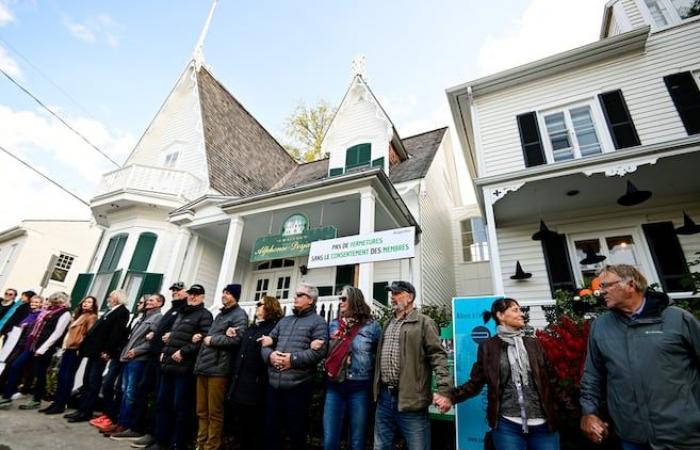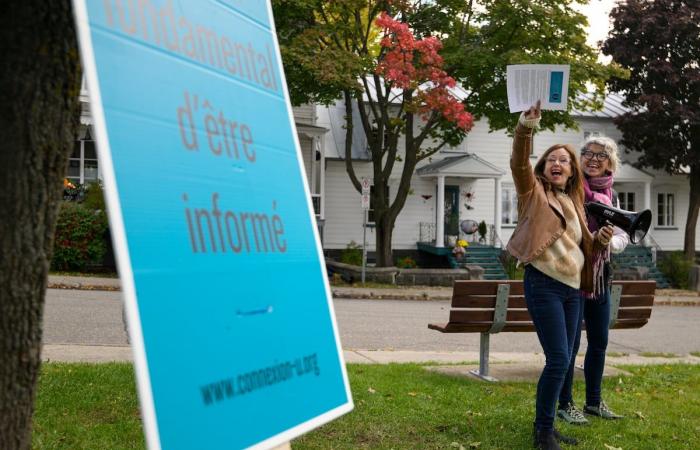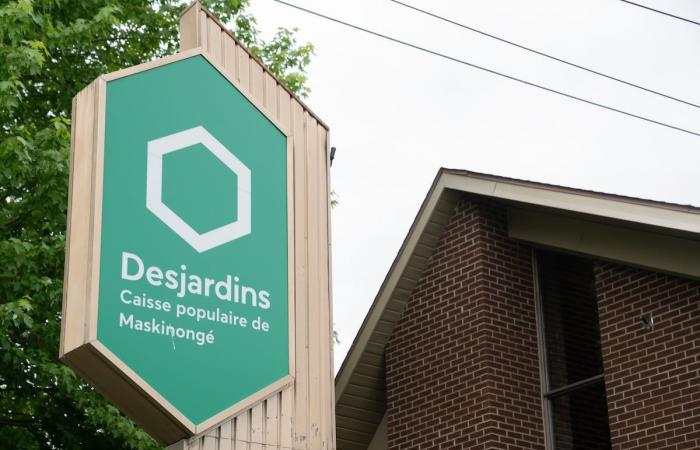“The way they do things is completely disgusting”: village mayors are disgusted by the way their Desjardins service point was closed.
Tuesday, they gathered around Alphonse-Desjardins’ house, in Lévis, and at the National Assembly to ask Quebec to force the cooperative to stop closing its regional banks.
They are demanding in particular that the Minister of Finance, Eric Girard, declare a moratorium on the closures of credit unions.
Elected officials believe that closures are more often than not imposed on communities, that they harm the economic activity of villages and the autonomy of elders.
Several elected officials participated in the march to Desjardins head office on Tuesday. From left to right: the spokesperson for Desjardins, Jean-Benoit Turcotti, the CEO of Connexion-U, Sylvie Bergeron, and the mayor of Saint-Gabriel-de-Rimouski, Georges Deschênes. (Caroline Grégoire/The Sun)
By the end of 2026, Desjardins plans to close approximately a third of its service points and ATMs.
Against the “digital economy”
The mobilization, which dozens of municipal councils joined through resolutions, is organized by Connexion-U.
This is a group “engaged and concerned about the issues and impacts of technologies on society” which is opposed, among other things, to 5G, “electromagnetic pollution” and “digital money”.
Its website features several texts warning against the “digital economy” and its ramifications, campaigning to “preserve [le] right to access to cash.
Connexion-U fears in particular that Desjardins will use the closure of its regional funds to put an end to paper money, making populations more vulnerable to government control and surveillance.
The leaders of Connexion-U, Sylvie Bergeron, president and CEO, and Nathalie Pelland, assistant director. (Caroline Grégoire/The Sun)
On its social networks, the citizen group also relays several controversial theories, in particular on COVID-19, the role of the World Health Organization and on a possible “World State”.
The elected officials present during the mobilization all claimed not to be aware of Connexion-U’s other positions.
They claim to have rallied after being contacted by the citizen group, which invited them to come together to contest the closures decreed by Desjardins.
“Faced with a fait accompli”
At a press conference at the National Assembly, municipal elected officials and Connexion-U representatives denounced the cooperative’s “classic” way of closing a credit union.
“We start by showing members the advantages of merging the funds, ensuring that there will be no closure,” they began.
Once the mergers are done, “we cut staff and opening hours, which reduces traffic.” Then, “we use the drop in traffic to justify the closures,” concluded the elected officials. “It’s the way of working.»
Once service points are closed, it is too late to turn back. “We find ourselves faced with a fait accompli.”

Several regional banks are the subject of consolidation attempts, including that of Maskinongé. (Stéphane Lessard/Archives Le Nouvelliste)
The mayor of Saint-Gervais, in Bellechasse, says that it only took a few weeks “and a five-minute call” to close his service point. In Saint-Gabriel-de-Rimouski, the time was even faster.
“We have the impression that they are doing this quickly, quickly, quickly so that there are not too many demonstrations or citizen gatherings,” summarizes Mayor Deschênes.
“Alphonse Desjardins would turn in his grave.”
— Georges Deschênes, mayor of Saint-Gabriel-Rimouski
Elected officials are also outraged at not having had access to the financial statements of their local fund before the decreed closures. According to them, Desjardins showed “no transparency”.
A hard blow for the villages
Like the dozens of elected officials who have deplored the loss of their service point in recent years, municipal elected officials have highlighted the impacts of the closure of a community’s credit union.
Financially isolated seniors, losses for local businesses and devitalization of village centers: “this is a very serious decision,” repeated the mayors and councilors present.
They even denounce that they were not able to discuss transitional measures with the cooperative, just to cushion the shock of the loss of services.
Despite everything, the elected officials present encouraged citizens to get involved in their local credit union to prevent closures.
They remain convinced that there is a way to avoid losses of services, but on condition that the population actively participates in safeguarding their fund. “Right now, there are 1% of people who vote [aux assemblées générales de Desjardins]“, they recalled.
Asked to comment, Desjardins said it “understands the concerns of members […] regarding the evolution of its physical network”, but having to “adapt to new transactional habits, while only 1% of transactions are done at counters and 3% at ATMs”.
The cooperative promised “not to abandon any member” and to “continue its exchanges with the municipalities [pour] put in place solutions that facilitate the transition.
Despite numerous protests over the last decade, Desjardins has never changed its mind after closing a fund.








